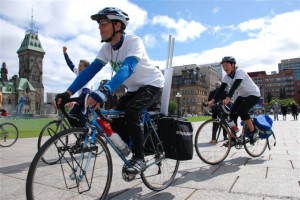Peace and Environment News, November–December 2009
by Mike Buckthought
On September 15, Pedal for the Planet riders hit Parliament Hill after riding across Atlantic Canada, Québec, Ontario, the Prairies and British Columbia.The riders relayed a message from Canadians across the country: we need to stop Canada’s backpeddling on climate change. Canada must do its fair share.
At the rally on the Hill, we were joined by NDP Leader Jack Layton, Linda Duncan (NDP, MP Edmonton-Strathcona), Bruce Hyer (NDP, MP Thunder Bay-Superior North), Bernard Bigras (Bloc Québécois, MP Rosemont-La Petite-Patrie) and Francis Scarpaleggia (Liberals, MP Lac-Saint-Louis).
We heard some inspiring words from the riders — Malkolm Boothroyd, who cycled all the way from Whitehorse, and Martina Nowak, who cycled from Victoria. Nathalie Houle and Eugénie Capel spoke on behalf of the many cyclists who crossed Québec.
After the rally, cyclists joined a virtual world tour around Ottawa, a low-carbon journey to search for Canada’s missing climate action plan. We were welcomed by Wim Geerts, Ambassador of the Netherlands to Canada. He talked about how the Netherlands encourages cycling as a sustainable form of transportation.
We rode to Bangladesh and Tuvalu, countries hit by rises in sea level, and Costa Rica, which plans to go carbon neutral by 2021. We visited the European Union, which is taking action to switch to renewable energy.
We finished our ride outside the Embassy of Denmark. Deputy Head of Mission Jakob Henningsen talked about how cycling is encouraged in Denmark. In Copenhagen, almost half of trips to work or school are by bicycle.
What is Canada doing? We hope these examples will inspire Members of Parliament to create a climate plan for Canada. They can start by supporting the swift passage of Bill C-311, the Copenhagen Climate Bill.
The next night, Pedal for the Planet riders and Members of Parliament returned to the Hill for a special screening of “The Age of Stupid.” The film presents a clear warning: future generations are threatened by increasing temperatures, extreme weather events and rising sea levels. The September 16th screening was presented by Sierra Club Canada and Linda Duncan, MP for Edmonton-Strathcona.
We would like to congratulate all the riders and volunteers across Canada who joined Pedal for the Planet. People cycled thousands of kilometres, braving bears, blackflies and torrential rains on windswept roads.
A small group of dedicated volunteers and staff members spent countless hours in meetings, while most people were away on summer vacation. Without all our hard work, Pedal for the Planet would not have been possible. We would like to thank everyone for joining us.
Mike Buckthought is the national coordinator of Pedal for the Planet, a cross-country climate relay to support urgent federal action on climate change. Pedal for the Planet was organized by staff and volunteers from Sierra Club Canada, Oxfam Canada, Climate Action Network and other organizations across the country. For more information about Pedal for the Planet, visit www.kyotoplus.ca/pedal.
Peace and Environment News, Volume 24, Number 6, November–December 2009, page 3.

